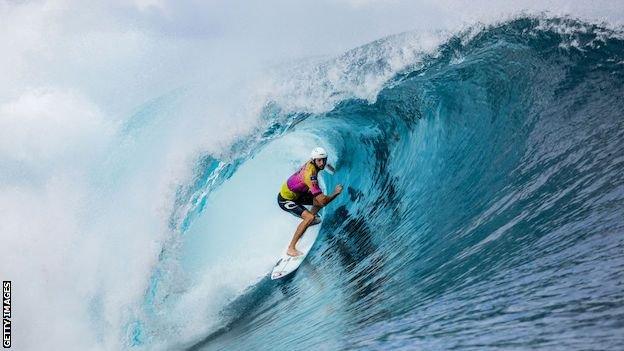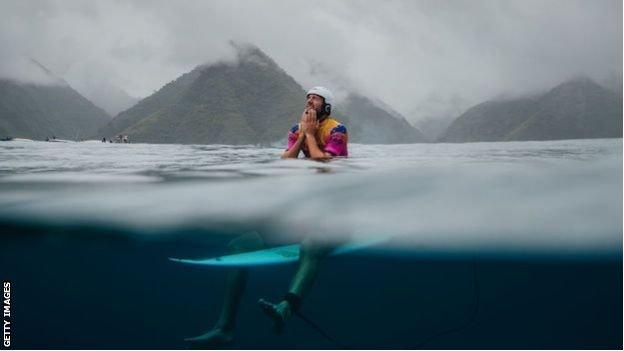Owen Wright: Australian surfer on comeback from traumatic brain injury to reach Tokyo 2020 Olympics
- Published

Owen Wright is currently ranked 20th on the WSL Championship Tour
The "pure joy" of catching that perfect wave never diminishes for Owen Wright but he also knows all too well just how wrong it can go.
He's straight to the point. "I had to learn to walk again and learn to surf again."
The 2015 season had been going so well for Australian Wright, then ranked fifth on the World Surf League's Championship Tour. He was going for the world title and "in some of the best form of his life".
But while training in the lead-up to the final event of the year in Hawaii, a wipeout changed everything. A 15-foot-plus wave that caught him out proved the final straw after a series of previous smaller concussions, leaving him with bleeding and swelling on the brain and the official diagnosis of a traumatic brain injury.
"Some of the detail is a little bit blurry still," Wright tells BBC Sport.
"A wave landed on my head and it shook me so hard that then I just kind of lost my senses. It was a long road back from there.
"It was explained to me that all of it's still in there, it's just you've got to reconnect those brain patterns."

Surfing runs through the veins of Wright's family. He is one of five siblings who all surf; sister Tyler is a two-time women's world champion while brother Mikey is also on the Championship Tour.
"My dad had this philosophy that if you can get one kid to surf, then fathering is easy," he says.
As he disappeared from the public eye, it was his family who rallied around in the aftermath of his injury as he struggled to get a grasp of its severity.
He was acting "like there was nothing wrong" because it wasn't visible - no cuts or grazes, no cast or crutches. In the end, the family had to stage an intervention.
"I don't think I fully always understood the seriousness of it because of the nature of the injury. I was a little bit loopy," says the 31-year-old.
"If you ask my friends and family, I was trying to surf the whole time. They had to take my surfboards away from me. I could barely walk the length of the house, but I was still trying to go for a surf."
When he was eventually allowed his boards back, some months later, it wasn't the easy return to the water he had been expecting.
"I couldn't get to my feet so it was a very mixed bag of emotions. I just didn't know how to stand up."
That was March 2016.
Exactly a year later, in March 2017, he won the the Quiksilver Pro Gold Coast - his first competition back on the Tour, 15 months after his last.
It was an emotional win for more than just the obvious reason. He beat his best friend Matt Wilkinson in the final, a man who had been by his side throughout his injury, and was greeted on the beach by his now-wife Kita and their baby son.
"I was still in a very, I guess, impaired way and there was a lot of conflict between the parties of whether I should be surfing or not," Wright says.
"For me to come out and win that first comp of the year was something so extremely special, and it just showed to me the power of just dreaming and having that vision and never losing sight of it."

Wright takes a moment after winning the Tahiti Pro Teahupo'o in 2019
Wright has been left with some lasting effects of the injury, although "nothing he can really complain about". He takes extra precautions now, however, and can often be seen donning a helmet during training and competitions.
Such protection is a rare sight in the sport and Wright wants to see it become more commonplace - he now views it as his job to "be more vocal" about its availability.
"I wear it whenever I feel that there's risk for myself. If the risk factor goes up, I put a helmet on," he says.
"If there's lots of people and it's crowded, I'll put a helmet on because of the risk of someone else's board hitting me. If the waves are big, I put it on. If there's rocks, I put it on.
"There's a lot of surfers out there, intermediates, beginners, kids to excellent surfers, that are not acknowledging the risk to your head and your brain. When that does get injured, nothing else works.
"There's a simple answer for it. There's a helmet and I want to see it become a part of surfing."
He was wearing a helmet when he won the Tahiti Pro Teahupo'o in 2019 - one of the biggest waves in the world - and he could wear one in the coming weeks when he, and surfing, make their Olympic debuts in Tokyo.
Unlike Tahiti, the surfing location for the Paris 2024 Olympics, Japan is not renowned for its big surf and Tsurigasaki Beach is not going to offer the biggest waves to competitors.
But the Games were the light at the end of the tunnel for Wright, a chance to wear his country's colours on the biggest stage and bring the sport to a new audience.
"The Olympics was a big goal of mine," he says. "I kind of slipped off world title pace being with a head injury and my ability to spin and flip and do aerials was quite impaired, but I can still surf really well, and qualifying for Olympics was something that was a very real possibility for me.
"So I put all my effort into that and I ended up qualifying for the top spot for Australia and it was that moment for me where I felt like yes, I'm there and I'm fully back.
"I love achieving things in the sport and I felt a little bit that I wasn't able to achieve what I'd like [after the injury], and being selected for the Olympics felt like I had that sense of a big win again and a big win for myself."
So if qualifying for the Games was a big win in itself, could an even bigger victory be in the offing?
"I think it's going to be interesting," Wright says. "I think I've got a really good shot."